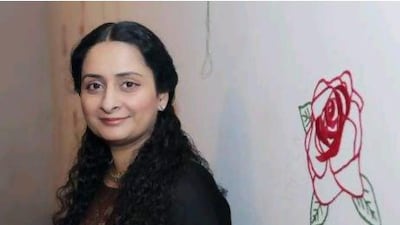As artistic challenges go, it's literally huge. Aisha Khalid trained in the famous Mughal art of miniature painting at the National College of Arts in Lahore, going on to become one of the foremost, and most interesting, practitioners of the form in the world. And yet, I meet her in front of an immense blank wall at the Whitworth Art Gallery in Manchester, UK, which she has been commissioned to fill with one massive new work. Not only that, Khalid has decided to make this new piece, part of her Larger Than Life exhibition, appear as though she has embroidered fabric roses directly on to concrete walls. "Well, it's certainly going to be a challenge," she agrees, puffing out her cheeks.
But if anyone can make this commission work, it’s Khalid. Her international reputation was founded on her miniatures. Traditionally, miniature artists copy the old forms, but her works comment on contemporary life in Pakistan. And Khalid soon branched out internationally: one of the highlights of the 2011 Sharjah Biennial was her Kashmiri Shawl, where a beautiful pashmina scarf hung from the ceiling, decorated with gold studs. It was only when the viewer walked around the back of the installation that its true meaning became clear: the studs were actually viciously sharp spikes. An intriguing comment on the political realities of the Kashmiri region, it’s the kind of work that led Newsweek to include her in its list of 100 Women Who Matter in Pakistan earlier this year.
“Actually there’s a new list out soon: the 100 most powerful women in Pakistan. I’m one of them as well!” she laughs, with a wicked glint in her eye. “Seriously, though, it’s great to be thought of in that way, particularly as an artist. It’s a good time for artists in Pakistan actually – we’re on the news, we’re getting interviewed. And it’s simply because the art scene is flourishing and getting recognised outside Pakistan.”
Coming from Pakistan, she says, it’s impossible for her work not to have a political dimension. Post September 11, 2001, it’s difficult to ignore. But what is interesting is that she doesn’t necessarily make art that might be more palatable for western audiences - even if she admits to tailoring her commissions to the country in which they’re set. In fact, Khalid often explores a much thornier issue: how Pakistan has been affected by outside interference.
“I love my country and I would never directly criticise it,” she says. “Our colonial background, our new issues surrounding Afghanistan, affect us deeply. You know, people ask whether art can ever change anything, but I not only have liberty and the power of expressing things through art, but the sense that people listen to what I say. Take that Kashmiri shawl. It’s now travelled all over the world.”
But what makes Khalid so interesting is that she isn’t a polemicist. The piece in the Whitworth is a direct and thoughtful reflection on the colonial connections between the twinned textile cities of Manchester and Faisalabad, where she was born in 1972, and how machines destroyed craftsmanship. And her work exploring Islamic pattern-making comes from a completely different part of her character.
“You know,” she says, getting ready to start on the wall once again, “success for me is people understanding what I’m trying to say – whether that’s political, spiritual or historical. So, if you’re in Manchester and you’re looking at this artist from Lahore who has come here to make this work, maybe I can make you realise you have links you weren’t previously aware of.
“In the end, you see, art should be about making a connection.”
The spiritual side of Aisha Khalid’s work
Aisha Khalid also has a fine body of work investigating classical Islamic geometric patterns and giving them a contemporary twist – some of which was also at the Sharjah Biennial.
She explains how this very personal interest fits with the rest of her work.“The floor of my childhood home was a geometric pattern, so my interest in the memories of all that was something I wanted to explore. But it’s gone off in many different directions too and not all of them now are directly from Islamic geometrical patterns.
"I must say I’m more interested in spirituality and the relationship of a person with a God than specifically investigating Islam the religion. Some people just see pretty patterns, but I do think that geometrical work does have as much meaning as a piece that is obviously ‘about’ an issue.
"There’s a possibility in this area of my studio to express feelings in a different way – through colours, shapes, perspectives. It’s like a different language, in a way. And it will evolve. All my work is connected with me in some way, and so it changes as I change. That’s quite exciting actually – you never quite know what will happen next.”
Aisha Khalid: Larger Than Life is at the Whitworth Art Gallery, Manchester, until January 27. For more information, visit www.whitworth.manchester.ac.uk

